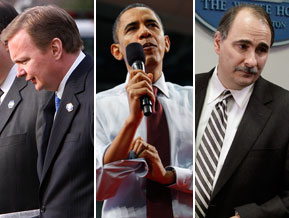
President Barack Obama gave another speech on Obamacare today in Virginia at George Mason University, and such speech may be the most misleading speech ever given by a US President
As the reality that Obamacare is going to pass the House of Representatives sinks in after the House’s 222-203 vote yesterday to approve the use of the “Slaughter Solution” (which “deems” the Senate bill “passed”), President Barack Obama took to the stage at George Mason University to make a speech reminiscent of his campaign speeches in 2007-2008: short on actual details and heavy on unrealistic, misleading claims with grandiose rhetoric mixed in for good measure.
Sadly, the President made claims he almost certainly knows are false (you can keep your doctor, you can keep your health plan, Obamacare will reduce the deficit, for instance) while omitting any explicit reference to the $500 billion in cuts to Medicare (over the next 10 years) used to fund over half of the nearly one trillion dollars in new entitlement spending under Obamacare for the years 2014-2019 (major benefits do not begin until 2014), making today’s speech a contender for the most misleading Presidential speech in American history. Further, as leaked just now, a Democratic leadership memo to congresspeople instructs them to lie to the media and public about the substance behind the CBO preliminary scoring while ignoring the realities of the additional $371 billion in federal spending set to be enacted by Democrats as an add-on to Obamacare known as the “doctor fix” immediately after the passage of Obamacare.
Obama’s speech recycles most of the misleading talking points used by Obama and the Democrats over the past year despite the debunking of such claims by objective fact-checking organizations and simple reality, as will be outlined below. Obama began by accurately stating that the Obamacare debate is really “a debate about the character of our country.” Obama then goes off the rails somewhat with this rhetoric, stating that the question of passing Obamacare is about
“Whether we can still meet the challenges of our time. Whether we still have the guts and courage to give every citizen, not just some, the chance to meet their dreams.”
In fact, Obamacare is about whether the United States will move towards a new, radically altered system of strict federal government control and oversight of the health care industry or whether the United States will continue on its present path of substantially private-run health care. The drive of Americans to meet the challenges of “our time” is of course not epitomized by a massive increase in government spending and control over the health decisions of Americans, regardless of Obama’s expertly-crafted rhetoric above. Indeed, Obamacare will fundamentally alter the character of the United States, making most American citizens reliant upon a giant federal government bureaucracy, instead of themselves, for the provision of life-saving health care, forever altering the balance between citizen and government in this country.
As the American health care system is now the envy of the world, both in terms of innovation of new cutting-edge techniques and quality, and most world leaders come here for major health care for themselves personally, taking a giant step away from our present system via the massive new federal intervention into the health care industry in Obamacare can accurately be seen as risking America’s present dominance in the health care field internationally. Of course, Obama’s speech references none of these issues nor the 80% of Americans that presently approve of their personal health care arrangements.
Obama then moves onto a familiar rhetorical trick of framing all opponents to Obamacare as insurance industry hacks, stating that we cannot “accept a system that works better for the insurance companies than the American people” while “their lobbyists are stalking the halls of congress as we speak” and that “if this vote fails, the insurance industry will continue to run amok.” These arguments are substantially false as the health insurance companies will actually benefit in part from his bill as all healthy, young Americans who presently do not waste their money on pricey, unnecessary health insurance policies will now be forced to purchase same or face an IRS penalty and enforcement of same by IRS collection efforts. Of course, Obama’s speech does not reference this penalty on individuals, nor the additionally penalty on employers who do not provide benefits, in his speech today.

At this point, President Obama and Dems in Congress appear to have made more deals than Monty Hall ever did in "Lets Make a Deal"
Obama then makes a wildly inaccurate statement:
So the only question left is this: are we going to let the special interest win once again? Or are we going to make this vote a victory for the American People!
This claim, of course, ignores the fact that, at best, only about 35-40% of Americans support the passage of the President’s comprehensive health care plan into law, making its coming passage hardly a “victory” for the American people, 80% of which are presently satisfied with their medical care. Also ignored by this Obama claim that his bill is being opposed by “special interests” is the fact that Obama himself has made backroom deals with the large drug companies (“Big Pharma”), American Medical Association, the hospitals, the AARP, the unions, and even some insurance companies as the past year of backroom dealmaking between the Obama Administration and special interest groups has unfolded. The level of “audacity” required to claim his bill is not backed by special interests while he himself made deals with essentially every major special interest in the health care industry during meetings in his White House is substantial and this Obama claim is quite jarring when compared to the above-referenced publicly available facts.
Obama then continues in his speech to claim, as he has many times since the summer of 2009, that “the time for reform is right now. Not a year from now, not 5 years from now not 10 years from now not 20 years from now” while noting that “we have had a year of hard debate, every proposal has been put on the table, every argument has been made, we have incorporated the best ideas from Democrats and from Republicans into a final proposal that builds on the system of private insurance that we have.” These claims, of course, ignore the fact that the Republican ideas to reduce health care costs via tort reform and allowing increased competition between insurers across state lines are ignored by his legislation and those issues also go unmentioned in Obama’s speech today.
Obama then denies that his plan is “radical change” (somewhat contradicting his earlier comments extolling the major changes to come from his bill) and states that “what we’re talking about is common sense reform, that’s all we’re talking about.” Now, Obama unleashes three of the greatest lies ever told about Obamacare:
If you like your doctor, you’ll be able to keep your doctor. If you like your plan, you’ll be able to keep your plan. Because I don’t believe we should give the government or the insurance companies more control over health care in America. I believe it’s time to give you – the American people – more control over your health insurance.
Of course, the massive federal intervention into the American health care system will lead to many Americans having their present health care arrangements substantially altered, whether by a doctor who retires rather than face the increased costs of federal control, or by the new strict federal rules that require certain benefits to be covered, or by an employer who dumps their benefits coverage and just pays the fine to avoid the hassle, or by the elimination of nearly 10 million seniors “Medicare Advantage” coverage. amongst other ways such personal health care arrangements will be altered.
As for Obama’s claim that he does not want to “give the government or the insurance companies more control over health care” and instead wanting to give the “American people” “more control” over their health insurance, such a statement simply defies all logic and available facts known about Obamacare as many new federal rules and regulations will be implemented and enforced on the American health care system, hence increasing federal government control of same, as intended by its authors. Of course, Obama’s speech avoids any discussion of the massive increase in the federal government’s bureaucracy in his remarks today and instead Obama implausibly denies that his bill will increase federal power over the health care industry, as it is written and intended to do. Also unmentioned in Obama’s speech is the 15,000 new IRS employees to be hired to enforce the new Obamacare personal and company fines and taxes in Obamacare as well as cost of new federal health bureaucrats to “administer” Obamacare.
Obama then summarizes the parts of his nearly 3000 page bill that he wants to talk about, stating his Obamacare plan does three things: first, it “ends the worst practices of insurance companies” as implementing “a patients’ bill of rights on steroids”; second, “[f]or the first time, small business owners and others…will have the same kind of choice for private health insurance that members of congress give to themselves”; and third that it “brings down the cost of health care for families, businesses and the federal government.”
While the President does accurately state that insurers will be required to issue insurance policies to all those who have preexisting conditions that cost hundreds of thousands if not millions to treat every year at a cost that is not above a healthy person’s policy, the remaining two claims in his formulation are unequivocally false. All Americans will certainly not have coverage like members of Congress after Obamacare passes, this is simply a lie. Elite politicians will continue to receive gold-plated health care plans whether Obamacare passes or not, and the average American will either be fined for not purchasing such expensive coverage or the federal government will their own tax dollars (or borrowed dollars) pay to provide coverage made more expensive by Obamacare’s provisions.
Despite this reality, Obama makes this ridiculous claim during his discussion of his second main point that Americans will receive the same coverage as Congress:
“We will offer you tax credits to do so – tax credits that add up to the largest middle class tax cut for health care in history.”

President Barack Obama's speech today on Obamacare reminds some of concepts referenced George Orwell's classic book 1984
Amazingly, Obama terms his planned new spending, in his own words, of at least a “100 billion a year” on a new federal health care entitlement program via Obamacare, as the “largest middle class tax cut for health care in history.” Such an explicitly misleading presentation of the new entitlement programs in Obamacare certainly recalls the works of George Orwell, such as the book 1984, and this Orwell quote in the aftermath of World War 2 in 1945:
People can foresee the future only when it coincides with their own wishes, and the most grossly obvious facts can be ignored when they are unwelcome. . . To appreciate the danger of Fascism the Left would have had to admit its own shortcomings, which was too painful; so the whole phenomenon was ignored or misinterpreted, with disastrous results…The most intelligent people seem capable of holding schizophrenic beliefs, or disregarding plain facts, of evading serious questions with debating-society repartees, or swallowing baseless rumours and of looking on indifferently while history is falsified.
Above and beyond the false and misleading claims above, President Obama’s ridiculous claim today that Obamacare is “one of the biggest deficit-reduction plans in history” is definitely the most odious and explicitly false statement made by President Obama in his speech today, which in our view ranks as one of the most misleading Presidential speeches in American history. Of course, the giant new entitlement spending in Obamacare (at least 100 billion a year according to Obama today) will not reduce the yearly federal budget deficit, and Obama knows it. However, Obama and the Democrats keep repeating this claim, even claiming it is “one of the biggest deficit-reduction plans in history” based on entirely misleading numbers from the CBO.
It is true that the CBO issued a preliminary report on the latest nearly 3000 page long Obamacare plan today in which the CBO states the bill will cost about a trillion dollars over 10 years (only 6 years of benefits, but 10 years of taxes and Medicare cuts) while allegedly “saving” over a hundred billion in deficit spending over those first 10 years and over a trillion in deficit spending over 20 years. However, the CBO is forced to score the language and assumptions provided to it by the Democrats in charge of Congress, and cannot interject the CBO’s own opinion as to whether those assumptions will bear out or whether subsequent Congresses will change the language.
The first major misrepresentation in the CBO’s claim of deficit savings is the failure to include the “doctor fix” in the CBO’s scoring of OBamacare. The CBO’s claim of deficit spending assumes a 21% cut in doctor and hospital fees, as present law requires. That law, a 1997 act to reduce Medicare spending over time, has been waived every year since then by Congress under pressure from the AMA lobby and others. The Obama Administration, of course, made a little-publicized deal between Obama and the AMA in July 2009 to purchase their support for Obamacare by promising a long term “doctor fix” as a part of the comprehensive health care reform procedure, as reported by Politico then:
In the bill, Democrats provide $245 billion to eliminate an annual shortfall in payments to doctors under Medicare. Democrats resolved this annual headache, in large part, to win crucial support for the bill from the American Medical Association. That money currently counts against the overall costs of the bill, but Democrats have introduced legislation that would remove remove this obligation from federal deficit.
Whether you take the $245 billion dollar figure over 10 years quoted here by Politico, or the $371 billion dollar figure reported by Politico today (before they pulled the story under White House pressure) for the cost in federal spending of a long term doctor fix, the claimed $138 billion in deficit “savings” over the next 10 years completely disappears and Obamacare ends up being in the red, even putting aside all the other budgetary tricks we will outline below. Indeed, the CBO just issued an update to their report, in response to GOP Congressman Paul Ryan’s (R-WI) letter, admitting that Obamacare will add to the deficit once the doctor fix is in place, as promised by both President Obama to the AMA to buy their support and by Nancy Pelosi today in her news conference:
You asked about the total budgetary impact of enacting the reconciliation proposal (the amendment to H.R. 4872), the Senate-passed health bill (H.R. 3590), and the Medicare Physicians Payment Reform Act of 2009 (H.R. 3961). CBO estimates that enacting all three pieces of legislation would add $59 billion to budget deficits over the 2010–2019 period.
Of course, Obama was well aware of these facts regarding the lack of deficit savings when the doctor fix is factored into Obamacare, and Obama still explicitly stated today that his plan will be “one of the biggest deficit-reduction plans in history.” This Obama claim, a willful misrepresentation of the true cost of his program by not “counting” the doctor fix that Obama himself promised to the AMA to purchase their support for his program in July 2009, brings to mind the Orwell quote above that “most intelligent people seem capable of holding schizophrenic beliefs, or disregarding plain facts, of evading serious questions with debating-society repartees, or swallowing baseless rumours and of looking on indifferently while history is falsified. Sadly, the explicit misrepresentation of the President in claiming that Obamacare is “one of the biggest deficit-reduction plans in history” is not solely based on the doctor fix lie, but many others as well.
Even the NYT, via its Obama-worshipping columnist David Brooks, admits that the Obama claim of deficit savings is an explicit lie, and the CBO report of deficit “savings” is simply the product of legislative gimmicks by the Democrats:
They’ve stuffed the legislation with gimmicks and dodges designed to get a good score from the Congressional Budget Office but don’t genuinely control runaway spending.
There is the doc fix dodge. The legislation pretends that Congress is about to cut Medicare reimbursements by 21 percent. Everyone knows that will never happen, so over the next decade actual spending will be $300 billion higher than paper projections.
There is the long-term care dodge. The bill creates a $72 billion trust fund to pay for a new long-term care program. The sponsors count that money as cost-saving, even though it will eventually be paid back out when the program comes on line.
There is the subsidy dodge. Workers making $60,000 and in the health exchanges would receive $4,500 more in subsidies in 2016 than workers making $60,000 and not in the exchanges. There is no way future Congresses will allow that disparity to persist. Soon, everybody will get the subsidy.
There is the excise tax dodge. The primary cost-control mechanism and long-term revenue source for the program is the tax on high-cost plans. But Democrats aren’t willing to levy this tax for eight years. The fiscal sustainability of the whole bill rests on the naïve hope that a future Congress will have the guts to accept a trillion-dollar tax when the current Congress wouldn’t accept an increase of a few billion.
There is the 10-6 dodge. One of the reasons the bill appears deficit-neutral in the first decade is that it begins collecting revenue right away but doesn’t have to pay for most benefits until 2014. That’s 10 years of revenues to pay for 6 years of benefits, something unlikely to happen again unless the country agrees to go without health care for four years every decade.
There is the Social Security dodge. The bill uses $52 billion in higher Social Security taxes to pay for health care expansion. But if Social Security taxes pay for health care, what pays for Social Security?
There is the pilot program dodge. Admirably, the bill includes pilot programs designed to help find ways to control costs. But it’s not clear that the bill includes mechanisms to actually implement the results. This is exactly what happened to undermine previous pilot program efforts.
When an Obama-loving NYT columnist who is literally in love with President Obama, for reasons such as his “his perfectly creased pant“, admits that Obama and the Democrats have stuffed Obamacare with no less than seven “dodges” to obtain a favorable, yet explicitly false, CBO scoring, centrists and independents know that such claims of deficit “savings” must be false. Finally, on top of the seven listed “dodges”, according to the CBO, and not included in the “scoring”, is the fact that the CBO “double counts” the Medicare cuts as both helping Medicare’s solvency and paying for new spending while another $50 billion in unscored costs are likely to administer the massive new federal entitlement programs and federal controls over the health care industry contained in Obamacare:
In its March 11, 2010, cost estimate for H.R. 3590, the Patient Protection and Affordable Care Act (PPACA), as passed by the Senate, CBO indicated that it has identified at least $50 billion in specified and estimated authorizations of discretionary spending that might be involved in implementing that legislation. The authority to undertake such spending is not provided in H.R. 3590; it would require future action in appropriation bills.
Finally, the President also plays misleading rhetorical games regarding the “cost controls” in Obamacare. The only significant cost control mechanism in the Obamacare package (as tort reform and interstate competition between insurers are omitted) is the “cadillac tax” on gold-plated health insurance policies, however, that tax was pushed off until 2018 because of pressure from unions who’s members have such insurance plans. Accordingly, in order to make the ridiculous claims of deficit savings referenced above, Obama pretends that Congress in 2017 will not waive the “cadillac tax” under political pressure, as he has just done with the delay until 2018 and as every Congress has done every year since the 1997 Medicare cost-cutting legislation (which is the source of the “doctor fix” problem in the first place). Indeed, if Obama with a huge Congressional majority cannot enact a cadillac tax within the next 8 years, why should anyone have any confidence that Congress 2017 will do so? Obama, and everyone else in Washington, knows this is an unrealistic fantasy, but Obama still made these ridiculous claims in his historically misleading speech today.
Finally, just as Congress has waived the planned reductions in fees for doctors and hospitals every year since 1997, future Congresses in all likelihood will also waive the planned nearly $500 billion in cuts to Medicare over the next 10 years to avoid a backlash by elderly voters who fear benefit cuts and pressure from medical provider lobbies. The cuts to Medicare are over half of the revenue Obama plans to use to fund the new health care entitlement spending of $100 billion a year, and everyone in Washington knows these cuts will never happen in full. Obama’s speech, of course, makes no reference to the “doctor fix” or the Medicare cuts themselves which form half of the revenue for his programs, but Obama certainly does claim that his plan is “one of the biggest deficit-reduction plans in history”, and all of his fellow Democrats are repeating similar claims all over the dial as this article is written. Such intentionally misleading statements by American leaders again remind centrist and independent Americans of the words of George Orwell as referenced above, reinforced by Obama’s ridiculous claim his “reduced” health care costs from Obamacare will mean that employers “can afford to give you a raise.”
A final Obama quote from today sums up the fraudulent nature of his speech, as he claims “more than $1 trillion” in deficit savings, considering the facts noted above. This comment is the only reference to the $500 billion in cuts planned for the Medicare system, and of course Obama does not reference Medicare by name:
And by the way, if you’re curious, well, how exactly are we saving these costs? Well, part of it is, again, we’re not spending our health care money wisely. So, for example, you go to the hospital or you go to a doctor and you may take five tests, when it turns out if you just took one test, then you send an e-mail around with the test results, you wouldn’t be paying $500 per test. So we’re trying to save money across the system. (Applause.) And altogether, our cost-cutting measures would reduce most people’s premiums. And here’s the bonus: It brings down our deficit by more than $1 trillion over the next two decades.
The pure idiocy of Obama’s example of emailed tests as his primary cost-cutting mechanism to cut nearly $500 billion from Medicare speaks for itself. Obama gave his speech to an auditorium of students at George Mason University, as such young college students are Obama’s last remaining base of support with his approval slipping underwater, as more Americans disapproving than approving of his performance in all major polls released this week. One can only hope that America does not have to find out the hard way, via renewed economic instability emanating from runaway deficit spending as envisioned by the actual provisions of Obamacare, not to mention the loss of medical innovation and job creation from the health care industry and the historical alteration of the relationship between American citizens and the federal government, that the claims made in Obama’s speech today are wholly false and that his speech was likely one of the most misleading speeches ever given by a sitting American President.



